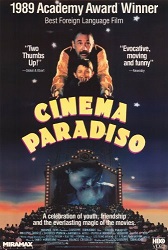Review of 'Cinema Paradiso (Nuovo Cinema Paradiso)'
 A mother calls her famous film-maker son, Salvatore 'Totò' Di Vita (Jacques Perrin) to inform him that his childhood friend Alfredo (Philippe Noiret) is dead and will be buried the next day. Salvatore reminisces of his boyhood home in Southern Italy in the years following World War 2. As a boy (Salvatore Cascio) he befriends Alfredo, the projectionist at the local cinema, captivated by not only the magic of film but also the handling the massive film projector. The “Cinema Paradiso” cinema serves as the only source of entertainment for the small village and attracts large audiences every night. When Alfredo is blinded by an accident, the young Toto rescues him, and steps in as the projectionist. As a teenager (Marco Leonardi), Toto seeks the attentions of Maria (Antonella Attili), an attractive young woman who is initially hesitant to Toto's advances. Their relationship appears to be doomed from the start with Maria's parents determined to keep them apart…
A mother calls her famous film-maker son, Salvatore 'Totò' Di Vita (Jacques Perrin) to inform him that his childhood friend Alfredo (Philippe Noiret) is dead and will be buried the next day. Salvatore reminisces of his boyhood home in Southern Italy in the years following World War 2. As a boy (Salvatore Cascio) he befriends Alfredo, the projectionist at the local cinema, captivated by not only the magic of film but also the handling the massive film projector. The “Cinema Paradiso” cinema serves as the only source of entertainment for the small village and attracts large audiences every night. When Alfredo is blinded by an accident, the young Toto rescues him, and steps in as the projectionist. As a teenager (Marco Leonardi), Toto seeks the attentions of Maria (Antonella Attili), an attractive young woman who is initially hesitant to Toto's advances. Their relationship appears to be doomed from the start with Maria's parents determined to keep them apart…
An absolutely incredible film full of compassion and magic without fancy sets or incredibly famous actors. The story is told simply yet with an elegance of touch that immediately draws you in. This is a very real story with the occasional shocking moments that remind you of this. This is cinema verité - The cinema of the real despite being fictional. The direction of the film is superb with every shot perfectly framed and every scene perfectly paced. Though, perhaps, artistic, this is a film that is far from the inaccessibility that word often suggests - This is not an elitist film in any way nor, would I suggest, “art house” (yes, it is in Italian with subtitles, but trust me, do not let this put you off). The film does show slight signs of the period in which it was made (the late 1980s) generally “Cinema Paradiso” has aged incredibly well.
Maestro Ennio Morricone, who is probably best known for his scores of Sergio Leone's “spaghetti westerns” including The Good, The Bad and The Ugly, delivers a stunning soundtrack. Though often quite repetitive the music sits lightly behind the scenes, greatly enhancing our emotions and drawing us in, precisely capturing the events on screen. I challenge you NOT to remember the theme tune having seen the film.
The actors appear to hardly acting at all with their natural performances utterly believable throughout with a stand-out performance from the amateur 10-year old Salvatore Cascio as the young Toto. Every minute he is on the screen you cannot take your eyes from him as he truly captures the wonder of youth. French actor Philippe Noiret is another it is hard to take your eyes off of as the compassionate Alfredo taking Toto under his wing, distracting him from a difficult family life and drawing him into the magical world of the cinema. None of the characters are perfect and yet we feel for each and every one of them.
There are several versions of this film: The original international cinema version of it (123 minutes) cut out key plot elements including an explanation of what actually happened between Toto and Maria that is restored in the “director's cut” which is by far the superior version to see.
An amazing film that truly captivates and may even make you cry. A story of life: Childhood wonder, friendship, love, and reflections on what might have been.
Rating: “I have absolutely no complaints”
Review Date: 2020-05-23
Directed by: Giuseppe Tornatore
Studio: Cristaldifilm
Year: 1988
Length: 174 minutes
Genre: Melodrama
https://www.imdb.com/title/tt0095765/